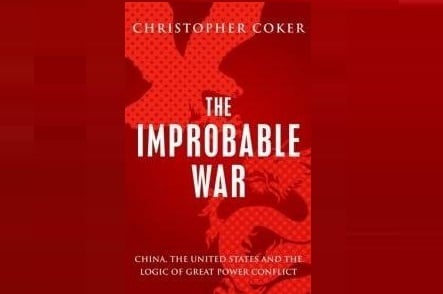The Improbable War
China, the United States, and the Logic of Great Power Conflict
25 يوليو 2015

By Christopher Coker
Reviewed by G. John Ikenberry
Coker takes aim at what he considers a dangerous liberal misconception: that today’s world of complex, interlocked economies and shared interests has made war between major powers, such as China and the United States, irrational and therefore unlikely. In the years prior to World War I, many held a similarly sanguine view about Europe; such optimists soon learned that rationality was not the constraint on violence they believed it to be.
As Coker explains, ideology and emotional appeals to “national purpose” have just as much influence on states as sober cost-benefit assessments of the national interest.
He stops short of predicting a Sino-American, but he convincingly argues that the rise of China will be as disruptive to the U.S.-led international order as the rise of Germany after 1870 was to the British-led order of that era.
China will want to rewrite the rules of the system and reassert its place in Asia, and the United States will inevitably resist. Deep cultural and ideological divides between China and the United States will make a peaceful power transition even more difficult. What worries Coker most is intellectual complacency.
If leaders in Beijing and Washington think war is impossible, they will not do the hard work of overcoming the mistrust and antagonism generated by their conflicting interests, worldviews, and values.
—————————————
Source: Foreign Affairs Magazine
 عن أمل جنبلاط المتجدد: لبنان يستحق النضال
عن أمل جنبلاط المتجدد: لبنان يستحق النضال
 صحافيون أم عرّافون!
صحافيون أم عرّافون!
 ماذا يجري داخل أروقة بيت الكتائب المركزي؟
ماذا يجري داخل أروقة بيت الكتائب المركزي؟


 عن الخرائط التي تُرسم والإتفاقات التي تتساقط!
عن الخرائط التي تُرسم والإتفاقات التي تتساقط!
 “الإنحراف في الحياة”/ بقلم كمال جنبلاط
“الإنحراف في الحياة”/ بقلم كمال جنبلاط
 هاشتاغ #صار_الوقت يحل أولاً في حلقة جنبلاط
هاشتاغ #صار_الوقت يحل أولاً في حلقة جنبلاط
 طاولة نقاش عن أزمة الصحافة في جامعة AUST
طاولة نقاش عن أزمة الصحافة في جامعة AUST
 عبدالله: ليظهر لنا وزير مكافحة الفساد حرصه في صفقات البواخر والفيول
عبدالله: ليظهر لنا وزير مكافحة الفساد حرصه في صفقات البواخر والفيول
 عبدالله: غريب أمر وزارة مكافحة الفساد!
عبدالله: غريب أمر وزارة مكافحة الفساد!

 Comment to Uri Avnery: How Sad What Is Looming Ahead
Comment to Uri Avnery: How Sad What Is Looming Ahead
 “Not Enough!”
“Not Enough!”
 … لمن لم يقرأ يوسف البعيني/ بقلم وسام شيّا
… لمن لم يقرأ يوسف البعيني/ بقلم وسام شيّا
 كمال جنبلاط في مولده الأول بعد المائة: تعاليمه وأفكاره ما زالت الحلّ/بقلم عزيز المتني
كمال جنبلاط في مولده الأول بعد المائة: تعاليمه وأفكاره ما زالت الحلّ/بقلم عزيز المتني
 رئيس حزب/ وليس (… سابقاً)/ بقلم د. خليل احمد خليل
رئيس حزب/ وليس (… سابقاً)/ بقلم د. خليل احمد خليل
 التوازن السياسي في لبنان
التوازن السياسي في لبنان
 لبنان… مشاريع انقلابية مؤجلة
لبنان… مشاريع انقلابية مؤجلة
 جنبلاط وحَمَلة أختام الكاوتشوك
جنبلاط وحَمَلة أختام الكاوتشوك
 Le Liban est un symbole de tolérance
Le Liban est un symbole de tolérance
 Our Automated Future
Our Automated Future
 The True Origins of ISIS
The True Origins of ISIS
 Les Misérables vs. Macron
Les Misérables vs. Macron
 عذراً أيها المعلم/ بقلم مهج شعبان
عذراً أيها المعلم/ بقلم مهج شعبان
 رساله الى المعلم / بقلم ابو عاصم
رساله الى المعلم / بقلم ابو عاصم
 إلى روح القائد والمعلم كمال جنبلاط/ بقلم أنور الدبيسي
إلى روح القائد والمعلم كمال جنبلاط/ بقلم أنور الدبيسي
 أسرار وعناوين الصحف ليوم الجمعة 14 كانون الاول 2018
أسرار وعناوين الصحف ليوم الجمعة 14 كانون الاول 2018














